October 20th, 2010 / 4:10 pm
Craft Notes
Guest Post: Janey Smith
Craft Notes
Publishing Gone Wild: Writers? The city is yours!
So, writers, now that TATTOOS are protected speech, what about GRAFFITI? Is GRAFFITI (i.e. nonsense scribbling, political messages, tags, excerpts from your favorite novels, etc.) on public or private surfaces (i.e. walls, sidewalks, garage doors, sides of cars, etc.) protected speech? Why? Why not? If so, then why are we submitting our works to magazines and journals when entire cities lie before us?
Here are some words I saw while walking.

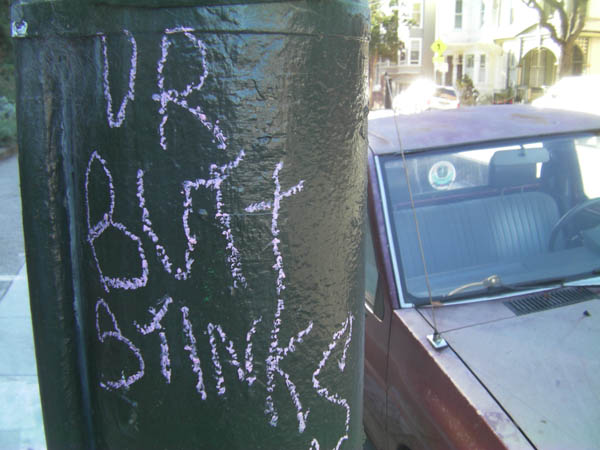

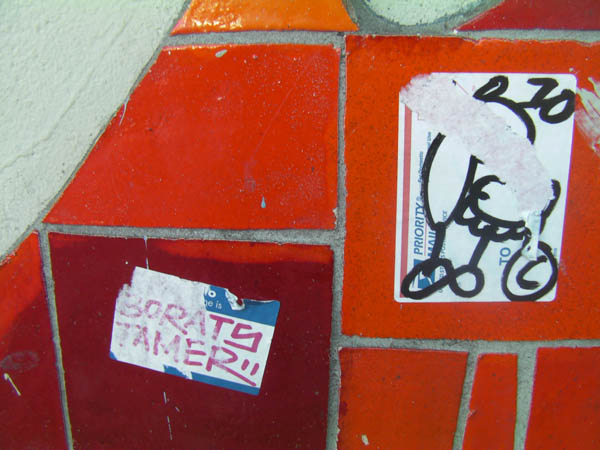
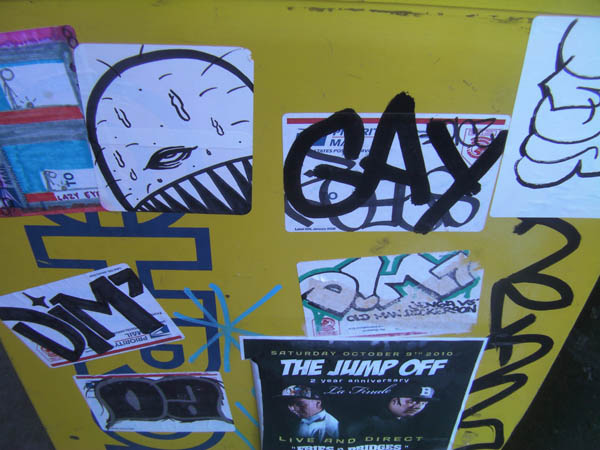
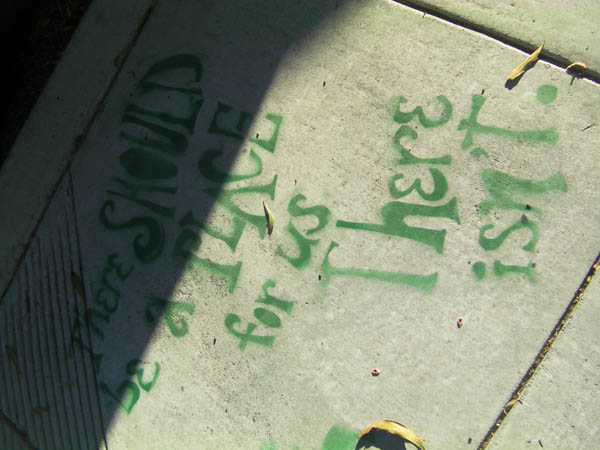
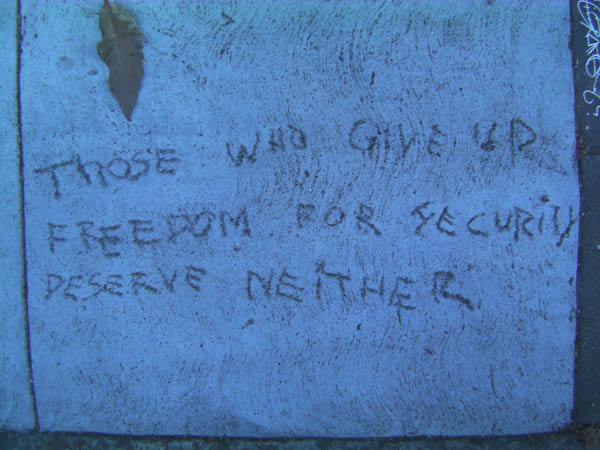
Tags: Grafitti, janey smith, tattoos

mj?
“The mechanics of spacing” makes a nice contrivance while at the same time showing that urban space is a space that moves. It also brings to mind medieval printing techniques–so you’ve really got me thinking also about the history of our reading experiences.
I wonder, though: Are our passions to write informed by market forces only? Or can those passions not be contained, compelling us to write anywhere, all the time, thus, defying the logic of the publishing market (i.e. on-line/in-print magazines, journals, etc) and turning our focus onto the streets–or wherever?
It’s the surface of things, oddly, that becomes one of the central questions concerning our right to write. And this surface is also “outside.” Regardless, I believe it’s a writer’s “duty” to break the law.
Tim? Your city gave birth to Peter Sotos. That’s pretty fucking cool in my book!
jereme_dean? Would definitely like to know more about your “street poetry project”!
The mechanics of spacing can greatly change the impact of a message, ie: UR BUTT STINKS can easily become U R BUTT STINKS if one doesn’t take into account adequate spacing properties.
Janey’s city is way cooler than mine.
Graffiti on private surfaces is probably still illegal. Not because of what it says, but because of where it says it. Sort of like how you’re allowed to call someone an asshole, but if you break into someone’s house and call them an asshole it’s still breaking and entering.
Fuck yes janey. I am working on a street poetry project at the moment. Glad to see this here.
uhm since when do you break into a house to throw some words up on a wall?
well, I mean if the wall is private property, doing something to it (like painting it) is equivalent to breaking into someone’s house. but now that I spell it out it makes less sense than I thought at first.
maybe something closer is keying a person’s car. if someone keys “fuck you” into the side of a car, the car’s owner can’t prosecute them because it says “fuck you” but they can because their car was defaced.
Like all the time.
The word house here is relative. A home is anything. A fenced off train yard is a home of train cars, although it may not be a home to a “living thing”, for example.
But that is a hilarious image, b&e&name-calling.
mj?
“The mechanics of spacing” makes a nice contrivance while at the same time showing that urban space is a space that moves. It also brings to mind medieval printing techniques–so you’ve really got me thinking also about the history of our reading experiences.
I wonder, though: Are our passions to write informed by market forces only? Or can those passions not be contained, compelling us to write anywhere, all the time, thus, defying the logic of the publishing market (i.e. on-line/in-print magazines, journals, etc) and turning our focus onto the streets–or wherever?
It’s the surface of things, oddly, that becomes one of the central questions concerning our right to write. And this surface is also “outside.” Regardless, I believe it’s a writer’s “duty” to break the law.
Tim? Your city gave birth to Peter Sotos. That’s pretty fucking cool in my book!
jereme_dean? Would definitely like to know more about your “street poetry project”!
Trey? I think you’re probably right. It’s certainly one thing to write on public property, which we all contribute to paying for and maintaining, and another thing to write on private property. But, there are some weird “in-between” spaces, too.
Anyway, the courts tend to protect the private rights, and properties, of individuals. And the supreme court itself has made a distinction between speech, on the one hand, and conduct, on the other. But, I’m wondering: Why can’t a writer’s “private” visions be put on display for a public to view–whether that public wants it or not–the way a corporation’s “private” visions can be put on display in the forming of advertising (e.g. billboards)? I mean, sidewalks are ours, right?
In other words, money doesn’t always equal speech–the way the Court would have it, right?
well, I’m definitely not making any sort of judgment. I’m definitely not saying that someone who graffitis a wall, public or private, is a bad person, just that the police probably won’t be so sympathetic. so I do think a writer can put a private vision on display for public viewing, especially if they don’t get caught!
and in regard to your last statement, I think money shouldn’t always equal speech, though maybe it does now. and maybe what you propose is a way to combat that. not sure. I don’t know anything about graffiti because I’m not from the big city or anything. the town I went to high school in had a bridge with “dropkick murphys” spray-painted on the side, but that’s about it.
trains have no ego, they cannot “own” the house they keep. this doesn’t work either.
once again, this doesn’t work.
people aren’t writing on cars, they are writing on public spaces.
well, that’s what I’m saying. If it’s actually public property, things are hazy (legally). if the wall you write on is the side of my house, it’s different, right? that’s all I’m saying. or like with what mj said below, the point isn’t that the trains “own” the house, it’s that someone owns those train cars, and if you put graffiti on them, you’re defacing private property. I’m not making a judgment on that, but I’m saying that that is pretty definitely illegal, right?
Janey, I’m not talking about it much in public. The street poetry thing is one of a handful of “anonymous” poetry projects I’m hustling.
Art with as little ego as possible.
You my girl, hit me up on PM and i’ll tell you about it.
i used to be a “tagger” in the early 90s. the only surfaces i hit were publicly owned. i understand what you are saying.
the legality of the act is what needs to be discussed, i think.
what is considered holy and/or illegal by the majority is not my concern. fuck the white devil and all his rules.
if you woke to find the anonymous sentence “I LIKE TO TAKE PICTURES AND HIDE THE FILM” sprayed across your property wall, would you destroy or leave it?
I don’t think most graffiti (that I actually see) “makes [that particular] property public” – too often, it makes one inarticulate person’s shit everybody’s eyeball stank.
What’s the argument, not for the fact of (most) graffiti’s political-economic resistance, but rather for its effectiveness?
“the legality of the act is what needs to be discussed, i think. ”
probably, yes. I don’t think there’s a lot wrong with it. anything you don’t like on your own stuff can be removed. I guess the problem from a legal standpoint is that if someone else does it and you don’t like it, you have to pay to remove it. so that kind of sucks. but what janey is saying about using public areas (whether the actual surface be public or private) to provide a sort of balance to whatever corporate stuff has to be put up with in the same environment, that’s interesting/convincing as far as the usefulness of graffiti goes. and of course it has usefulness as expression. and of course usefulness isn’t the only measure of worth. so.
but yes, if someone sprayed that sentence across my wall, I’d probably leave it. I’d probably leave something that might actually be expressive. but I guess if someone sprayed across my wall “the person who owns this hates blacks and jews” or something, I’d probably remove that.
Why would someone graffiti private property? That doesn’t seem very nice.
I’d go back further…Lascaux, maybe?
Maybe this is a logical step. Cohen’s “Bridge and Tunnel” was written on public transportation, but maybe he should’ve gone a step further and written on the bridges and tunnels themselves.
Graffiti seems anti-capitalist, and therefore ‘good’, somehow. It makes all property public, and proves, if only in a small way, that no one really owns anything…
Eric? You are so making me smile. I think I am going to write my next novel all over the city of San Francisco, photograph each part, put it together, send it to friends.
— Methinks this all is excellent(*).
A TED-talk by some frantic wine-journalist motormouth has provoked me recently — “use everything” (regarding communication technologies), and this is just it, Janey. All your business-reply-envelopes should be returned adorned. Your back while biking might blink like a mobile marquee. Facilitator Butler recently waved his favorites into the electronic ethers — why not incant that out of your car? My pals and I used to stage “Sudden Salon”s outside the rapid transit station (after ire at enduring an awful open-mike in Berk, too much grey-hair poetry-therapy…) I am enamored of the “my name is” adhesives, and there is never enough to say about stencils. Why not wheatpaste your collages and canvasses? (Jack Smith: “Burn the Museums!”) I loathe when poets cease their prosody after all their stanzas are complete. Every inch of the urban earth must be covered with glitter! Don’t you have that itch? The answer is more art!
(*) A CAVEAT:
— Mehates all that scribble, unreadable!
What is your percentage comprehension of urban graffiti? Most of it is run by juveniles. Why have poets and graphic designers only rarely sought to reclaim this stunning art? The mural has become too sickening, all of the rainbow’s colors swirl, and psychedelia becomes brown, a murk, a headache! Single artists (rarely offered garage door canvasses) must take back the planar sharpie map from pubescent brats and hippy community do-gooders! And damn it, what can be done to invoke the cry: “avoid being illegible (unless enchantingly visual!)”?
I don’t think most graffiti (that I actually see) “makes [that particular] property public” – too often, it makes one inarticulate person’s shit everybody’s eyeball stank.
What’s the argument, not for the fact of (most) graffiti’s political-economic resistance, but rather for its effectiveness?
I’d go back further…Lascaux, maybe?
Maybe this is a logical step. Cohen’s “Bridge and Tunnel” was written on public transportation, but maybe he should’ve gone a step further and written on the bridges and tunnels themselves.
Yes I believe so. If for some reason all paper-type objects vanished from reality, we’d be forced to become graffiti artists. And I mean, the idea of samizdat becomes included in the discussion — simply because ones writing is regulated to staples between the cover of some heavy card stock should not stop the idea of it being graffiti. I believe graffiti is in terms of message (sometimes) and also delivery system. Not the object but the way the object is proliferated.
Market forces simply fed into our laziness — the publishing market as it has been built appears (now, to us) as an established structure with no need to struggle with building an entirely new model. It influences, of course, but see my above paragraph.
@jereme dean It isn’t about the trains and whether or not they are aware of where they live. Renters do not own their homes. It is really about who owns the trains, whoever owns those trains has right to where they call home, and their home can be anywhere, as long as the environment is tethered to enough paperwork and money. It disgusts me, but it is how it is.
Edits in the first and second paragraphs:
1: “I think the lack of education, or rather the lack of being ideologically indoctrinated into white patriarchal thought” should be “The lack of education, or rather the lack of being ideologically indoctrinated into white patriarchal thought?”
2: “…feel helpless, and that the only way they can express themselves…” should be “…feel helpless, and that graffiti is the only way they can express themselves…”
I do understand your point, and agree with it in some ways. What I mean by “the effectiveness of capitalism from the point of view of the have-nots” is that the have-nots are taught that this is the position they belong in, and that capitalism is effective in keeping them there.
What I mean by ”[n]othing is effective” is that the motivation to do anything, such as tag one’s name on a brick wall (or build that brick wall), must be conjured, constructed, even if the end is impractical. There is, conversely, a motivation to interpret graffiti as meaningless or frivolous, as that maybe fits better into the interpreter’s ideology, reinforces it.
I’m not saying that graffiti is necessarily a conscious protest against white patriarchal thought or capitalism, just that it is an expression (however futile) of frustration at the lack of socio-economic prospects as a result of them. I’m not saying it’s meant to change anything. As I said, there is no purpose, unless constructed.
As far as middle-class white kids being the ones either tagging or not having a problem with tagging, I guess I’m not as aware of that. I didn’t grow up around white people. I’m not sure you can quantify the number of white people tagging things, not like you can the number of rap albums purchased by middle-class whites who seek to emulate a cultural experience they’ve never had, an emulation which only reinforces racial hierarchies and cultural biases.
These are, as you rightly point out, the same people who will “‘tag’ America (and the world) by voting for corporately-funded libertarian Republicans,” and they will do so with a sense of superiority over the minorities they once sought to emulate. That they (middle-class whites) don’t have to unlearn this privilege is kind of my point: they are already members of the dominant group, and are maybe not as restricted by socio-economic conditions as minorities. They have a voice. Society already favors them.
I don’t see how saying that tagging is maybe the only way they can express themselves is condescending. I think it’s much more demeaning to ignore the social conditions which lead to graffiti-type vandalism or ideologies which advocate (however unconsciously) vandalism, or similar conditions which lead, out of desperation, to robbery or murder.
I see what you mean about graffiti being a “normalization of depersonalizing critique-liquefaction.” What I meant, though, is that it is, ironically, a reflection of the imperialistic practices of the U.S. A territorial marker. To the interpreter, it may seem depersonalizing but, to the author, it is an affirmation of existence, just as any work of art or literature.
Inarticulate? Because the person spraypaitnting wasn’t exposed to a proper education? Because capitalism failed them? How would you define inarticulate? I think the lack of education, or rather the lack of being ideologically indoctrinated into white patriarchal thought. Effectiveness? I’m not sure how to define that, either. The point is there is no point, there is no ownership, there’s no reason not to spraypaint “one inarticulate person’s shit” all over the place.
I think graffiti is actually an expression of the effectiveness of capitalism from the point of view of the have-nots, that it makes people who have nothing (including, perhaps most importantly, a voice in society) feel helpless, and that the only way they can express themselves (as they maybe never had the opportunity to learn music or art and certainly not the mechanics of grammar).
Graffiti also functions as a marker of territory. The US is an imperial force with a military that goes out into the world and takes what it wants. This military is just a big gang. We pretend to feel safe. Really, the military is just protecting private ownership, which is an illusion. People are dying for an illusion. What is the effectiveness of this? With the US military as an example, how can we look at gangs or anyone who wants to take a piece of land and make it theirs somehow, mark those territories and claim they are in control of it and think they’re bad? I don’t think there is a difference.
Nothing is effective. Effectiveness, like ownership, is an illusion. We imagine what we do means something, that it has purpose. Graffiti seems to prove that, and reminds us we don’t have to keep things to ourselves. I guess that’s a quick version of an argument I could make in favor of graffiti.
Janey, that would be sweet. You should do it. Well, not ‘should’, but ‘should’. I would like to see that…
Edits in the first and second paragraphs:
1: “I think the lack of education, or rather the lack of being ideologically indoctrinated into white patriarchal thought” should be “The lack of education, or rather the lack of being ideologically indoctrinated into white patriarchal thought?”
2: “…feel helpless, and that the only way they can express themselves…” should be “…feel helpless, and that graffiti is the only way they can express themselves…”
“Inarticulate” in the sense that tagging three initials, for example, on as many surfaces as possible expresses precisely neither an individual perspective nor solidarity with any critique of political economy.
“Ineffective” in the sense that, with no distinct action recommended or critique offered, tagging is a practice that empties itself of transformative perspective, regardless of the diligence and creativity of interpreters of it, interpreters who might imagine that “property” is being counteracted. One could easily say that tagging re-inforces the license of capital to exert violence in guarding its privilege of hyperaccumulation – a dollar is a paperized felt-tip pen.
‘Articulate’ would be action clearly directed towards political-economically transformative practices and policies. Scribbling initials on a bus stop or delivery van doesn’t change or criticize anything, and, as I see your defense of graffiti, to see critique and revolutionary practice in strident declarations that ‘Kilroy wuz here’ is to mistake critical motivation for mere antagonism.
You think tagging is a protest against “white patriarchal thought”?? I think lots of taggers are middle-class white kids who are inculcated with the idea that shitting their initials on every possible surface is normal – they won’t have to unlearn this learned privilege; they’ll get jobs in middle management eventually and ‘tag’ America (and the world) by voting for corporately-funded libertarian Republicans.
It’s also true that seeing, in taggers, that tagging is “the only way they can express themselves” is tremendously condescending to tha yoof.
Eric, I just don’t see revolutionary anti-“imperialistic” practice in graffiti – I see the opposite: a normalization of depersonalizing critique-liquefaction.
I do understand your point, and agree with it in some ways. What I mean by “the effectiveness of capitalism from the point of view of the have-nots” is that the have-nots are taught that this is the position they belong in, and that capitalism is effective in keeping them there.
What I mean by ”[n]othing is effective” is that the motivation to do anything, such as tag one’s name on a brick wall (or build that brick wall), must be conjured, constructed, even if the end is impractical. There is, conversely, a motivation to interpret graffiti as meaningless or frivolous, as that maybe fits better into the interpreter’s ideology, reinforces it.
I’m not saying that graffiti is necessarily a conscious protest against white patriarchal thought or capitalism, just that it is an expression (however futile) of frustration at the lack of socio-economic prospects as a result of them. I’m not saying it’s meant to change anything. As I said, there is no purpose, unless constructed.
As far as middle-class white kids being the ones either tagging or not having a problem with tagging, I guess I’m not as aware of that. I didn’t grow up around white people. I’m not sure you can quantify the number of white people tagging things, not like you can the number of rap albums purchased by middle-class whites who seek to emulate a cultural experience they’ve never had, an emulation which only reinforces racial hierarchies and cultural biases.
These are, as you rightly point out, the same people who will “‘tag’ America (and the world) by voting for corporately-funded libertarian Republicans,” and they will do so with a sense of superiority over the minorities they once sought to emulate. That they (middle-class whites) don’t have to unlearn this privilege is kind of my point: they are already members of the dominant group, and are maybe not as restricted by socio-economic conditions as minorities. They have a voice. Society already favors them.
I don’t see how saying that tagging is maybe the only way they can express themselves is condescending. I think it’s much more demeaning to ignore the social conditions which lead to graffiti-type vandalism or ideologies which advocate (however unconsciously) vandalism, or similar conditions which lead, out of desperation, to robbery or murder.
I see what you mean about graffiti being a “normalization of depersonalizing critique-liquefaction.” What I meant, though, is that it is, ironically, a reflection of the imperialistic practices of the U.S. A territorial marker. To the interpreter, it may seem depersonalizing but, to the author, it is an affirmation of existence, just as any work of art or literature.
even if the end is impractical [. . .] (however futile)
Well, for me, the ‘impracticality’ and ‘futility’ of most graffiti (that I actually see) indicates neutralization: flail your frustrated fists like this! have at it! – just don’t connect your rage with concerted understanding of its roots, or organize your practice with some communal political-economic movement, pal.
“condescending”
What I mean is that the kids – of any ethnicity and political-economic class – who tag are every bit as intellectually and ideologically armed for practical resistance to injustice as, who, jocks, or whiz kids, or achievementrons afraid to go home without good grades. Asking any kids to be docile in school is irrational and, usually, not helpful to them in their long run(s), but understanding this is no reason not to expect kids to be constructive in being on their own side(s).
At least as I see it, kids tag because it’s fun to be obnoxious, to be a hectic brat, and situating tagging in a strategy – albeit untutored – of resistance is inaccurately to make hope the better part of reasonable anticipation.